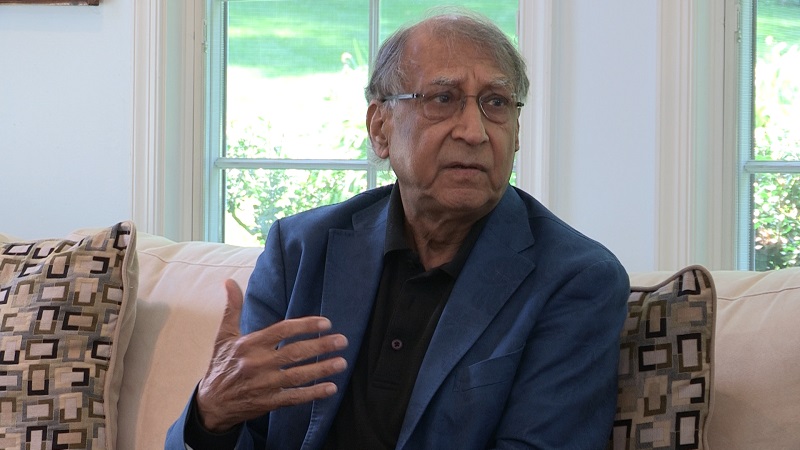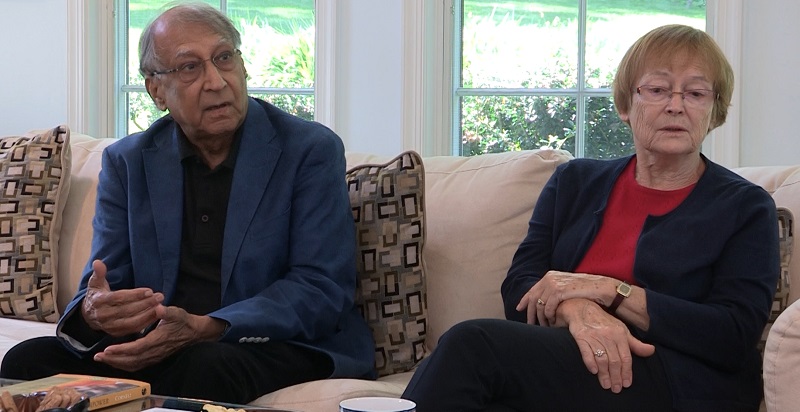Sehgal and his wife, Edda, have committed most of their wealth to philanthropy in India.

By Jayshal Sood
The only way India can solve the recurrent water crisis, which has led to hundreds of farmer suicides across the country, is by drastically increasing water storage capacity, prominent Indian American philanthropist Dr. Suri Sehgal said.
“The only solution [to the water crisis] is that we must be able to harvest the only source of fresh water — that is the rain,” the founder and chairman of the Sehgal Foundation told The American Bazaar in Washington, DC, on Monday. “[We] should be able to store water for the dry season.”
Water collection, storage and distribution are among the main focuses of the Gurgaon-based foundation, which has presence in more than 500 villages in the states of Haryana and Rajasthan.
Sehgal, one of the world’s leading experts in agriculture and hybrid seeds, pointed out that India’s water storage capacity is substantially less than other large nations such as the United States and China.
“India’s water storage capacity is very little. [India’s] water storage capacity is only 200 cubic meters per capita, whereas … in China, it is over 1,000 [cubic meters],” he said. “So India has one fifth storage capacity as compared to China; and India has one tenth the capacity as compared to America, although America [gets] very very good rainfall, the storage capacity in the dams or the wells or aquifers is much higher [than India’s].”
The Florida-based entrepreneur and philanthropist said the harvesting of water is all the more important given the depleting rainfall and relatively shorter monsoon. “Earlier monsoon used to be four months five months,” he said. “Now rainy season has become short.”
He also pointed out that the country’s capacity has actually also gone down in recent days. “In the old days, water used to be stored in ponds and the village wells and the aquifers,” he said. “All these have now come under brick and mortar.”
In the interview, Sehgal also spoke about the reason he and his wife, Edda, set up the foundation, the various projects the organization is running in India and their impact.
Sehgal, who has a PhD in plant genetics from Harvard University and a diploma in business management from Harvard University, founded two companies: Proagro Seed Company in India, and Misr Hytech Seed International, in Egypt.
He exited from business in 1998 to launch the foundation. But before that the Sehgals made sure that the men and women who stood by them during their entrepreneurial journey were taken care of: they shared part of their newfound wealth with more than 600 employees, from low-level workers to senior executives.
“First thing I did [after selling the business] was that I took part of the money and shared my fortune with every employee,” said Sehgal. “I felt very strongly that without the people we could not succeed in business. People made us successful.”
The next step was setting up the foundation. “I always felt very strongly that those of us who have had the good fortune in this country [the United States] that we should give back to our country of origin, country of birth which provided us free education and made everything possible,” Sehgal said.
After discussing with their family — the Sehgals have four children — the couple decided to take a miniscule amount for retirement and invest the remaining portion in public welfare in India, through Sehgal Foundation.
For both Suri and Edda Sehgal, their commitment to philanthropy had roots in the cataclysmal violence they both witnessed during their childhood.
Born in pre-partitioned Punjab in 1934, Suri Sehgal was just 13 when the Partition of India took place. The teenager got separated from his family and saw firsthand mindless violence during and after the Partition. He reached Delhi homeless and penniless and ate in refugee camps. Later, Suri got reunited with his family in Amritsar. But the family had lost everything during the Partition and had to start anew.
Similarly, Edda Jeglinsky’s family was also displaced from German Silesia during World War II in January 1945. She was evacuated, along with her family, before the onslaught of the Soviet army.
The two met at Harvard, where they both came to study. They got married in 1964 and now live in Captiva, FL.
‘Impact is bottom line’
After they started the foundation in 1999, Edda has also been deeply involved in its running. She traveled to India more than 40 times in the past decade and a half, Sehgal said.
In the past decade and a half, the foundation has also grown from eight people to 170 now.
Most of these employees work at the grass root levels in villages where the foundation has undertaken various development projects. This helps the foundation to work closely with local people and communities, stimulating them to participate and contribute in their growth efforts. “Our core staff is mostly PhDs who monitor the work,” the philanthropist added.

Asked why the foundation is putting a lot of emphasis on impact and sustainability, Sehgal said that it was imperative to measure the impact of every development effort that the organization does. “In the nonprofit side, impact is your bottom line,” he said. “There has to be impact and that impact has to be sustainable,” he said. “If you can’t measure it, don’t do it.”
The foundation has nine economists who regularly conduct surveys both before and after the start of any project. It helps the organization to measure the ground impact of its endeavors.
Sehgal also spoke about another initiative of the foundation that it started recently, the community radio Alfaz-e-Mewat (Voices of Mewat), whose goal is to involve and educate the local communities. The radio airs various interactive sessions discussing local issues, government policies, agriculture and water conservation initiatives.
The philanthropist said the foundation was overwhelmed by the response it got from the radio initiative. “We started [Alfaz-e-Mewat] as a small project. Our main thrust is that it should become a people’s program; not our program. Kanoon ki baat [“Legal Talks”] is one of our big programs — that is what are your rights as a citizen,” he said.
“The radio has become much more successful and it is beyond our expectation,” Sehgal said. “We have interactive program on the radio. And many calls coming in; thousands of telephone calls. Phone is always ringing. We invite experts to answer people’s questions. They can call and get an answer on the radio. Fantastic way of spreading the message.”
Watch the interview with Dr. Suri Sehgal



